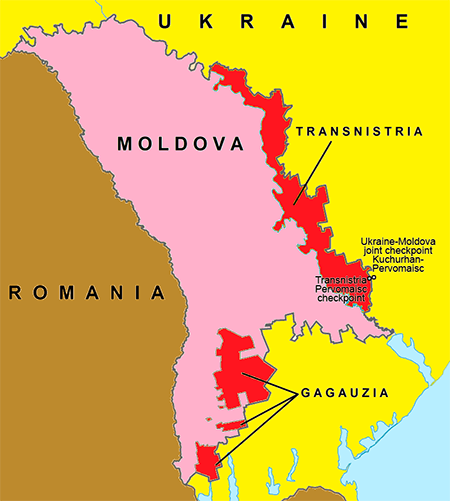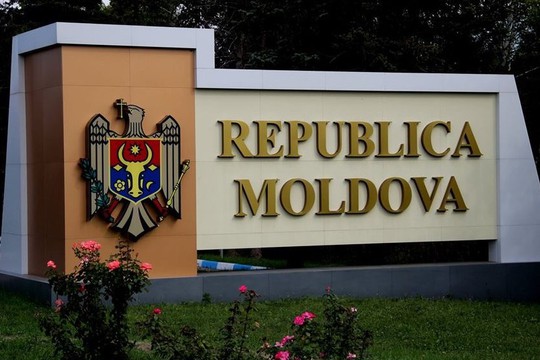Big Trouble may be brewing in Moldova which is starting to look like a staging area for the EU to offset an emerging Russian victory in Ukraine. Whether this plan will be successful, if it is attempted, is not clear. But Moldova is not the most stable country in the world, and the country is split between pro-EU and pro-Russian elements, writes Stephen Bryen, a former Deputy Under Secretary of Defense.
US troops are now in Moldova, along with Romanians. It is ostensibly a military exercise called JCET 2024 (Joint Command Exchange Training). The exercise started on April 1st and will continue until April 19th. According to a statement released by the Moldovan Ministry of Defense, "The aim of the exercise is joint training and exchange of experience between Moldovan, Romanian and American special forces, as well as to increase the level of interoperability between the participating contingents. This year's event will also be attended by representatives of the State Protection and Security Service and the Pantera Special Forces."
These exercises are not new. But they take on urgency now because of the developing situation in neighboring Ukraine.
The United States has made available nearly $320 million in new economic, security, and humanitarian assistance to help Moldova. This assistance includes $30 million in non-reimbursable budget support disbursed in December 2022 for electricity purchases. “The United States, working with Congress, also plans to make available an additional $300 million for energy assistance in Moldova to address the urgent needs created by Russia’s war of aggression against Ukraine and to strengthen Moldova’s energy resilience and security, including another $80 million in budget support to address energy and power costs,” according to the US State Department.
Officially Moldova is supposed to be a neutral country. There is talk of changing Moldova's Constitution to allow it to join military alliances and, potentially, to join NATO. Joint training with foreign countries (the US and Romania) would appear to violate the current constitutional neutrality provisions.
Romania is keen on building up its military relationship to Moldova. Legislation is pending in Romania to allow Romania to to intervene outside the country. Such actions are not limited to the military but may also involve other types of interventions to counter hybrid threats. The focus of the new law in Moldova and Ukraine.
According to Romanian sources, there are 600,000 Romanian citizens in Moldova (most with hybrid citizenship). Romania is positioning itself to "protect" its Moldovan citizens in case of conflict.
Moldova is the second poorest country in Europe after Ukraine. In 2022 Moldova's per capita income was $5,688. Ukraine's was $4,005 (before the current war). Eastern Europe has an overall per capita income of $11,855.
There has been an ongoing struggle in Moldova where the country is roughly divided into two camps: the pro-EU camp on the one side and the pro-Russian camp on the other. Right now the pro-EU camp is in power. They have outlawed pro-Russian opposition parties and organizations and jailed some of its leaders. In addition, the ruling party has closed 13 TV and media outlets on the grounds they were connected to Russia. Until mid-March the pro-EU party did not allow opposition candidates to run for local or national elections.
An illustrative case is that of the current elected governor of Gagauz autonomy, Evghenia Gutsul. Gagauzia is a Turkic-speaking, Russian Orthodox entity in the southeastern part of Moldova. Gutsul was a member of the Shor (or Sor) party, a pro-Russian party that was outlawed by the current government. She was not permitted to run for office under the party banner and she was accused of helping to illegally finance the Shur party. She decided to run for office as an "independent" and won handily. Gutsul is close to Moscow and to Vladimir Putin.
In March the high court in Moldova determined that outlawing the Shor party was illegal.

Meanwhile other countries are taking a keen interest in Moldova. An interesting example are the Germans who are supplying police to reinforce the border with Ukraine. Germany joined an EU-sponsored project to "ensure the security" of Moldova. This activity is mainly concerned with stopping Ukrainians escaping conscription and returning them to Ukraine, where they either face jail terms or being thrown into the front lines fighting Russia. The police also stop smuggling. How such activity squares with European human rights laws is an open question.
France is also activating key units of its Foreign Legion, many of whom are currently out of work having been kicked out of some African countries. According to press reports, 1,500 Foreign Legion troops are likely to be deployed either to Ukraine or to Moldova, either in May or June. Macron has been working overtime trying to gin up NATO support for intervention in Ukraine.
Transdniestria is a breakaway region which officially is called the Pridnestrovian Moldovan Republic. It has its own government and military. It is on the eastern side of the Dnistria river. Its capital is Tiraspol. The European Parliament has declared that this area is under Russian occupation. There is a Russian military contingent in Transdniestria, but it is made up only of 1,500 soldiers. There is also a massive Russian ammunition dump located there, a subject of much interest to the ammunition-starved Ukrainians. The army of Transdniestria is made up of 5,000 active duty personnel and 16,000 reservists. Much of its equipment is antiquated. By comparison, Moldova has an army of 6,500 active duty personnel and 2,000 annual conscripts.
In order for foreign troops to operate from Moldova on into Ukraine, either they would need to take over Transdniestria or, alternatively, put military forces into Gagauzia, which would likely trigger a civil war.
Moldova on its own is not of any strategic importance. However, it is a staging area and jumping off point for a strategy aimed at Odesa and, perhaps, the Crimea. What seems to be brewing in Europe is some sort of Plan B – in essence, what to do if the Ukrainian army collapses. Increasingly European specialists and some officials are opining that the days of Ukraine as an independent entity may be reaching an end.
Building up Moldova as a staging area therefore looks like an emerging potential strategy, the beginning of Plan B.
There are problems in using Moldova as a staging area. Its politics are very unsettled, and if the Russians really step up their efforts in that country, the pro-EU faction may find its future cloudy. That would potentially foreclose Moldova as an EU staging ground. Alternatively, the EU via Romania and others may send in troops to secure the pro-EU regime now in power, which could lead to an internal and bloody conflict.
read more in our Telegram-channel https://t.me/The_International_Affairs

 10:40 06.04.2024 •
10:40 06.04.2024 •























